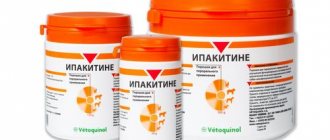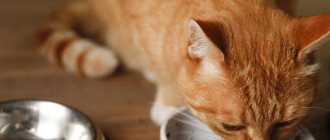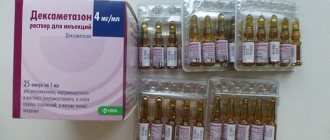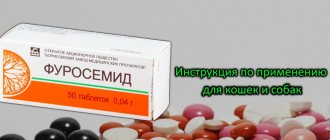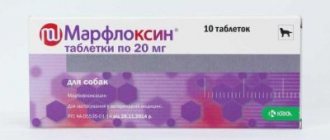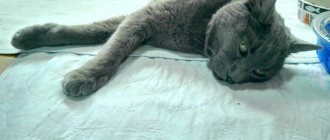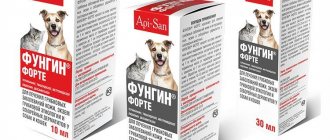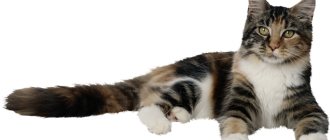Release form, composition and packaging
Ipaketine for cats is available in powder form for oral use. The tasteless, white powder is added to food or water.
The composition of the drug Ipaketine includes three active ingredients:
- chitosan - 7–9%;
- lactose - up to 100%;
- calcium carbonate - 9–11%.
Ipaketine is available in powder form, packaged in large plastic jars.
The medicinal powder is packaged in large jars of 60, 150, 180, 300 grams without additional packaging. The medicine comes with a measuring spoon, with which you can easily measure 1 gram of medicine. The rubberized lid seals the jar hermetically and protects the contents from moisture.
Ipaketine powder is easy to mix with wet food
Indications for use of Ipakitine in cats
Ipaquitine is prescribed to cats suffering from chronic renal failure of non-infectious etiology. This is a drug for palliative treatment that improves the pet’s well-being, prolongs remission and prevents the development of complications.
Drontal for cats: instructions for use
The use of Ipaketin is also indicated for polycystic disease, urolithiasis and kidney cysts. The drug can make life easier for a sick cat only in combination with IVs, which must be given to the pet for life. It will not help you recover, but it will give your furry pet a life without suffering.
Veterinarians and cat owners note that with treatment, the pet feels well and eats with appetite. When used correctly, Ipaquitine prolongs the life of doomed animals by several months.
Important! Ipaketine effectively helps with exacerbations of chronic renal failure. In the early stages of the disease, it is able to completely relieve symptoms and prevent its development.
If chronic renal failure is diagnosed at an early stage, then Ipaketina will need to be taken for the rest of its life, but this can save the cat from death.
Chronic renal failure manifests itself when more than 70% of the kidney nephrons are destroyed
pharmachologic effect
Ipaquitine for cats is used to alleviate the condition of pets suffering from chronic renal failure. The drug is recommended to prevent complications caused by the disease, as well as for disorders of calcium-phosphorus metabolism. The composition of the product is completely natural. The French company VETOQUINOL, the developer of the drug, decided not to use dyes, flavoring additives, or modified products in its production. Therefore, no side effects were observed during use even in animals weakened by the disease. Complex effect on the body: improvement of kidney function; adjustment of blood levels of creatinine, urea, cholesterol; normalization of calcium and phosphorus metabolism; increased hemoglobin; supports the functioning of the gastrointestinal tract. The effectiveness of therapy depends on the stage of the disease and symptoms. Usually the drug is used in combination with other medications. Application and dosage should be prescribed by a veterinarian.
Pharmacological (biological) properties and effects
Kanikvantel for cats: instructions for use
Ipakitine for cats affects the metabolism of phosphorus and calcium in the body. Its components bind to various substances in the body. Calcium carbonate binds to dietary phosphates, and chitosan binds to uremic toxins, cholesterol, urea, and creatinine. By forming strong bonds with toxic substances, the components of the drug remove them from the body.
Chitosan has many effective actions:
- reduces the amount of creatinine and urea in the blood, as well as uremic toxins;
- improves kidney function;
- increases hemoglobin levels;
- participates in fiber metabolism.
Calcium carbonate has other beneficial effects on the body:
- normalizes calcium levels in the blood;
- supports phosphorus-calcium metabolism in the body.
Thanks to the action of its components, Ipaketine for cats cleanses the body of toxins and supports the functioning of the kidneys and urinary system.
A cat with chronic renal failure needs daily IV drips.
IPAKITINE drug for cats and dogs for the treatment of chronic renal failure
IPAKITINE is a drug in the form of a white powder that is prescribed to dogs and cats with chronic renal failure to achieve longer remission, improve the condition and support the kidneys.
Older cats and dogs often suffer from chronic renal failure. Damage to the kidneys causes them to perform their function as a blood filter from toxins in the body worse and worse.
One of the main measures for chronic renal failure is to reduce the intake of phosphates from food.
IPAKITINE in powder form can be optimally used by mixing with wet food for an immediate effect of binding excess phosphate.
In case of chronic renal failure, it is recommended to limit phosphorus intake from food and monitor the phosphate content in the animal’s blood serum.
IPAKITINE contains chitosan, which binds toxins and is absorbed.
IPAKITINE is a phosphate binder, which is given with food and binds phosphate already in the food, so excess phosphorus cannot be absorbed. Improving phosphate balance has a positive effect on kidney function and prolongs life expectancy.
The powder has a neutral taste, so it is convenient to mix it with food for any whimsical animal.
Instructions for use:
GENERAL INFORMATION
Trade name of the drug: Ipakitine.
International nonproprietary: chitosan, calcium carbonate.
Dosage form: powder for oral use.
IPAKITINE in 100 g contains as active ingredients: chitosan - 8 g, calcium carbonate - 10 g and an excipient - lactose.
In appearance, IPAKITINE is a cream-colored powder, insoluble in water.
The shelf life of the medicinal product, subject to storage conditions, is 18 months from the date of manufacture.
It is forbidden to use Ipaquitine after the expiration date.
Ipakitine is produced packaged in plastic jars, hermetically sealed with plastic lids with first opening control, complete with a measuring spoon with a capacity of 1 gram. Each consumer package is supplied with instructions for use.
Ipakitine is stored in the manufacturer's sealed packaging, separate from food and feed, in a dry place, protected from direct sunlight at a temperature of 15 to 25 C in places inaccessible to children.
Unused medicinal product is disposed of in accordance with legal requirements.
Available without a veterinarian's prescription.
PHARMACOLOGICAL PROPERTIES
IPAKITINE belongs to a group of combined drugs that affect the metabolism of phosphorus and calcium.
Chitosan, which is part of the drug, belongs to the group of natural polymers obtained from crustacean shells. When chitosan enters the body with food, the level of indoxyl sulfate (an indole derivative formed during the metabolism of intestinal flora) and urea in the blood decreases, kidney function improves, due to which the level of creatinine in the blood serum decreases. Chitosan reduces serum cholesterol by binding bile acids in the intestine and increases hemoglobin levels. Chitosan is partially metabolized in the intestine and is primarily eliminated from the body through the large intestine.
When calcium carbonate enters the body, it forms strong insoluble compounds with phosphates, thus adjusting the level of calcium in the blood, and has an alkalizing effect that helps maintain optimal phosphorus-calcium metabolism in the body. Calcium carbonate is excreted from the body through the kidneys and large intestine.
In terms of the degree of impact on the body, Ipakitine is classified as a low-hazard substance (hazard class 4 according to GOST 12.1.007-76).
ORDER OF APPLICATION
IPAKITINE is prescribed to cats and dogs as part of complex therapy for chronic renal failure to improve the functional status of the kidneys.
IPAKITINE is contraindicated for use in cases of increased individual sensitivity to the drug or its components.
IPAKITINE is used orally, mixed with food at a dose of 1 g per 5 kg of animal weight, twice a day for 3-6 months.
There are no symptoms of drug overdose.
Features of the action during the first use of IPAKITINE and upon its cancellation have not been established. There are no restrictions or specifics on the use of IPAKITINE in animals during pregnancy and lactation.
Avoid skipping the next dose of the drug, as this may lead to a decrease in its therapeutic effectiveness. If one or more doses of the drug are missed, the course of treatment must be resumed in the prescribed dosages and dosage regimen.
When using the drug IPAKITINE in accordance with these instructions, side effects and complications in animals, as a rule, are not observed. If an animal develops allergic reactions, stop using the drug and prescribe symptomatic treatment.
There is no information about the incompatibility of IPAKITINE with other drugs.
IPAKITINE is not intended for use in food producing animals.
PERSONAL PREVENTION MEASURES
When working with the drug, you should follow the general safety rules provided for when working with medicinal products for veterinary use. During work, general rules of personal hygiene should be observed.
Empty drug packaging must not be used for household purposes; they must be disposed of with household waste.
People with hypersensitivity to the components of the drug should avoid direct contact with the drug IPAKITINE.
In case of accidental contact of the drug with the skin or mucous membranes, rinse them immediately with plenty of water. If allergic reactions occur or if the drug accidentally enters the human body, you should immediately contact a medical facility (bring the instructions for use or label with you).
Development organization: France.
Information about the composition and ingredients, color scheme, technical and other characteristics, country of origin, appearance and delivery package of the product is for reference only and is based on the latest information available at the time of publication. Delivery of this product is carried out to all regions of the Russian Federation.
Instructions for use and dosage calculation
The veterinarian individually prescribes the required dose of Ipaketine for cats. Instructions for use contain a detailed description of the medicine and methods of its use. Ipoketin must be given to a cat 2 times a day, morning and evening. Only the veterinarian chooses the dosage.
Cantaren for cats: instructions for use
According to the instructions, the recommended dose is 1 scoop (1 gram of medication) per 5 kg of cat weight. The course of treatment lasts from 3 months to six months. The number of courses of treatment and their duration depend on the condition of the cat and its individual characteristics.
The medicine can be easily mixed with drinking water, wet food, pate, meat broth or puree. Can be poured into the mouth through a syringe. The medicine has no taste, so cats do not notice it. If the cat only eats dry food, then it needs to be soaked in water. When the food gets wet and swells, you need to add Ipaketine powder to it and put it in a bowl. It is advisable to mix swollen food with dry food.
For 1 course of treatment you will need at least 2 cans of the drug. You can buy Ipaketin at a pet store or veterinary pharmacy, but it is not sold everywhere, you need to look for it specifically. You can order Ipaketina online and have it delivered to your home.
Important! During the course of treatment, the cat should drink a lot of clean water. You need to change the water in her cup 2 times a day and constantly add the right amount of drinking water. It is advisable to give your cat only boiled or spring mineral water.
Ipaketine can be dissolved in water and poured into the cat’s mouth through a syringe without a needle.
Features of treatment for cats
Ipakitine is intended for inclusion in complex therapy of animals with renal failure. It is not a symptomatic remedy, therefore it is not used during an exacerbation. The use of this drug is aimed at gradually cleansing the body of substances that harm the kidneys and aggravate the course of the disease. The result of treatment will be achieved only with the correct course of use, implying daily use of the drug for several months.
Selection of dosage
According to the instructions, the medicine should be given based on the weight of the animal. The formula is simple: a single dosage is 1 g of powder for every 5 kg of cat. The dose can be adjusted by the veterinarian depending on the concomitant diseases of the furry patient.
Reception scheme
Give the medicine twice a day, mixing it with wet food (pates, cereals, soups). If the animal’s condition is severe and it refuses to eat, Ipaquitine is diluted in water in a ratio of 1:4 and poured into the cat’s mouth using a pipette or syringe without a needle.
If the pet refuses to eat, the medicine is diluted with water and injected with a syringe.
The minimum course of treatment is 3 months. This duration of administration is prescribed for cats with stage 1–2 renal failure. For more severe forms of the disease, the course is extended to 6 months.
Precautionary measures
Ipakitine belongs to low-toxic drugs (has hazard category 4 according to GOST 12.1.007–76). However, it should be kept in a tightly sealed container and out of reach of children and pets.
Ipakitine can be used for one and a half years from the date of manufacture. It is strictly forbidden to use the drug after the expiration date.
Possible side effects and contraindications
A strict prohibition for using the medicine is intolerance to the components of the composition. A drug allergy in an animal is expressed in indigestion, vomiting, swelling of the mucous membranes, difficulty breathing, sneezing, coughing. If these symptoms occur, you should immediately stop taking Ipakitine. If the symptoms of intolerance are severe, you should take the cat to the veterinarian.
Sneezing, vomiting, indigestion - signs of drug intolerance
Special cases
The drug Ipakitine is approved for the treatment of pregnant and lactating cats. There is no need to reduce the dosage or adjust the duration of the course or dosage regimen. It can also be given to kittens of any age (for newborn babies, the medicine should be mixed with water and a dry formula that replaces cat milk).
Ipakitine is even suitable for treating kittens and pregnant and lactating cats
Interaction with other drugs
Ipakitina is allowed to be used with any medications prescribed by a veterinarian. There are no drugs that would lose the properties of this medicine or, conversely, reduce its effectiveness.
Contraindications and side effects
The only contraindication to the use of Ipaketin is hypersensitivity to the components of the drug and individual intolerance. If a cat develops an allergy to Ipaketin, use should be stopped immediately. The veterinarian will select a suitable analogue of the drug and adjust the course of treatment.
There are no overdose symptoms or side effects with Ipakitine. The drug does not cause withdrawal symptoms. This medicine can be taken by pregnant and lactating cats, as well as kittens.
Additional Information! Cats with chronic kidney disease and kidney failure require a low-protein diet. You can feed your pet with special medicated foods, for example, Royal Canin Renal or Hills Prescription Diet K / D Feline Renal Health.
With chronic renal failure, a cat needs medicated food, for example, Royal Canin Renal
Cost of the drug and its analogues
The cost of the medicine depends on its volume. A 60 g jar will cost approximately 900 rubles, a 300 gram package will cost from 2500 rubles. Purchase the drug only from trusted veterinary pharmacies and online stores.
If Ipakitina could not be found on sale, or the cat has an allergic reaction to it, then you can buy its analogues:
- Pronefra (suspension for cats, sold in 60 ml bottles)
- Renalcin (liquid drug in a bottle with a dispenser, 50 ml.)
Be sure to consult your veterinarian before changing medications.
Special instructions and storage conditions
When using Ipaketin, you must carefully observe the rules of hygiene: wash your hands before feeding the cat and after that, wash the cat's bowl after each meal. The medicine should be stored in a cool, dry place inaccessible to children and animals, for example, in a general first aid kit or in a separate box for veterinary medications. Do not allow direct sunlight to come into contact with the medicine package. Ipaketine should be kept separate from feed and food.
Do not remove the label from the package so as not to confuse Ipaketine with other medicines. The temperature required for storage is 15–25 °C. Shelf life from the date of manufacture is 18 months. After this time, the medicine cannot be used.
Additional Information! The main symptoms of chronic renal failure in cats are extreme thirst, frequent or complete absence of urination, frequent vomiting, diarrhea, cloudy or bloody urine, and weight loss.
There may also be an unpleasant odor from the mouth, a spot on the eye (retinal detachment), hair loss, non-healing ulcers on the body or mouth, lethargy and drowsiness. The animal may experience pain when urinating, so you need to carefully monitor its behavior. Sometimes your cat will ignore the litter box and urinate in inappropriate places.
At the first discomfort, the cat should be shown to a veterinarian
Advantages and disadvantages
Ipaketine for cats has many advantages and benefits over other medications.
Advantages of Ipaketina:
- Supports and improves kidney function.
- Reduces intoxication of the body, removes toxic substances.
- Reduces the level of protein, urea and cholesterol in the blood.
- Has a cumulative effect.
- It is tasteless and odorless, making it easy to use.
- Improves the well-being of your pet in the last months of its life.
- Extends life by an average of 8 months.
This unique drug has few disadvantages, but the problems that arise can be solved.
Disadvantages of Ipaketina:
- High price.
- It must be combined with other medications.
- Difficult to find in pet stores and veterinary pharmacies, not always in stock.
- In rare cases, it may cause allergies.
- Will not save you from death.
Today, Ipaketin is the most effective drug that helps pets with kidney diseases. Chronic kidney disease leads to a long and painful death, but medicine will relieve the symptoms of the disease.
Important! Cats should never be fed fish, as it can cause chronic renal failure (CRF). Sick animals should not be given meat or minced meat, only special food.
The course of treatment with Ipakitine lasts 3–6 months
Reviews about the drug
Unfortunately, we sounded the alarm late and took the cat to the doctor when the disease was already at the fourth stage - creatinine reached almost 600. The veterinarian prescribed several medications, including Ipaketin. We diluted the powder with warm water and gave it to the cat from a syringe, since she ate very poorly and there was no point in mixing the medicine with food. The drug is very good - it extended our pet’s life by six months, and without therapy she would hardly have been able to survive more than a month.
Tatiana
In combination with other medications, Ipaketin helps achieve long-term remission and keep urea levels under control - I can see this from the results of tests that the cat has to take every month. But the downside is that my pet categorically does not like the drug - the animal spits and refuses to eat. I adapted to pouring medicine into the cat’s mouth using a syringe, but this is still additional stress.
Maria
If we talk about kidney failure, Ipaketin is very good - it helps to cope with the symptoms of the pathology and achieve remission. With its help, we managed to extend the cat’s life by as much as 8 months, although the doctor warned at the beginning of treatment that the animal was dying. But I want to note that in advanced stages of chronic renal failure, the drug alone will not cope - it can only help the pet in combination with IVs, which will have to be continued until the very end.
Victoria
I can say that the drug does not have miraculous properties; it is prescribed more to stabilize the animal’s condition. However, while taking Ipaketin, my cat’s condition has noticeably improved - his appetite has appeared, and the frequency of visiting the toilet has normalized. By the way, it is very important to ensure that the animal always has clean water in its bowl, since it will want to drink much more often than usual. The drug is not cheap - I paid 1050 rubles for a jar of 180 grams, but I think that the life of a pet is still much more expensive.
Olga
Last summer I noticed that my cat’s hair began to shed, and she herself became much less mobile, although she usually ran around the apartment all day long.
I took her to the vet, he took all the tests and prescribed Ipaketina. I gave the medicine to the cat every day for three months, added it to the food in the morning and evening, measuring the required amount with a special spoon from a jar. The cat felt noticeably better. The drug definitely helped. Alexandra
